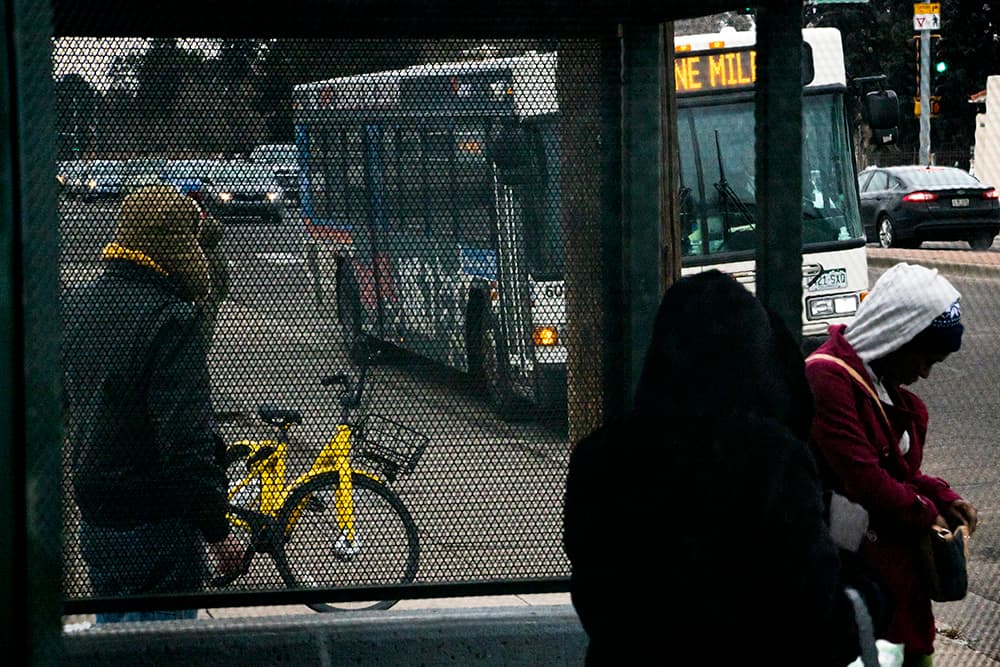The scooters will be back soon.
Denver Public Works is reviewing applications and beginning to issue permits to dockless mobility vehicle companies this week, and the department anticipates that the chosen companies will launch their fleets on July 30.
But there are still questions. A lot of questions. And in a Tuesday morning meeting that covered everything from a bike lane ordinance to "Blade Runner," the Land Use, Transportation & Infrastructure committee looked for answers.
"As y’all said, we were not ready. I don’t think we can again be not ready, because it’s going to come faster than ever," Councilwoman Mary Beth Susman said after a presentation from Public Works. "We cannot be in a situation to always be responding and taking a passive voice. We need to get on top of this. ... I think the scooters are a real good catalyst for us to understand that we are not ready and we need to be ready."
For now, though, the city is working with the reality that it was not ready. Cynthia Patton, director of mobility services for Public Works, told the committee this is the fastest she's ever seen the department move on something. A pilot program is officially getting underway now, with these stated goals:
- Test new innovations and their ability to meaningfully meet citywide mobility goals
- Implement programs that respect safety and infrastructure
- Increase the percentage of people who have access to and take public transit
- Provide accurate communication and guidance to public users of these services
- Scale new services and fleet sizes responsibly based on performance metrics
- Integrate new innovations seamlessly with the city’s existing transportation system
- Serve the communities that are most vulnerable while increasing their access to smart technology and new opportunities
The emphasis on that first one is ours because it's new since we last reported on the program.
As planned, the pilot is still running through the Transit Amenity Program, which means the distribution of vehicles will be organized around light rail and bus stops. Companies will be encouraged to incentivize users to dock the vehicles at transit stops and will be responsible for bringing them back to transit stops at the end of the day. At each stop, there will be "agnostic" parking zones painted on the ground where any company's vehicles can be parked.
They'll create two distinct types of one-year, revocable permits — one for bicycles and e-bicycles and one for scooters and "other."
That's what's new. For more on the pilot program, refer back to our July 16 story.
It's some of the pieces that aren't new that are raising council questions and eyebrows.
There's a lot of discomfort around requiring scooter users to ride on sidewalks, and some legal confusion, too.
Denver is the only city that requires that dockless mobility vehicles be used on the sidewalks, according to the team at Twelve Tone Consulting that's been studying the issue. A few weeks ago, report co-author Riley O'Neil told Denverite, "Riding on the sidewalk with something that moves that fast — it deserves a bike lane."
It turns out City Council members and their constituents are pretty concerned about this rule, too. The problem is the law.
"Folks are naturally more comfortable in a bike lane," Nicholas Williams, deputy chief of staff for Pubic Works, acknowledged. "We agree. It’s about how bound are we by state law."
And that's a sticky area. As it stands, a dockless electric scooter is legally considered a "toy vehicle," which are required to stick to the sidewalks. That means no riding through the streets and parks, and no riding in bike lanes.
Council President Jolon Clark asked whether there's any legal distinction between an on-street bike lane and a bike path like the Cherry Creek path and, told that there isn't, argued that their should be. He also wanted to know whether this is governed by city or state law.
Kirsten Crawford, legislative counsel for the city and county, stepped in to clarify that state law specifically says bikes in bike lanes, no toy vehicles in roadways. What Denver is obligated to do as far as enforcement is something they're still researching.
"These bike lanes aren’t just about bikes, they’re about mobility, they’re about transit," Clark said later, as the conversation circled back to the issue. The consensus in the room, generally, seemed to be that restricting a motorized vehicle that can reach 15 mph to the sidewalks is unsafe and illogical. They raised concerns about safety, injury lawsuits and whether such restrictions would hinder the goal of getting people away from single-occupancy vehicle transportation.
Councilman Rafael Espinoza suggested a rule that would say the electric scooters can't be used on streets that have stripes painted on them (those are major streets like Colfax Avenue) but are OK to ride on the streets that don't have stripes on them (residential streets), "and our cops would just know that’s an OK place for that vehicle and it’s easy math for our rider."
Susman raised the possibility of widening bike lanes to accommodate new types of vehicles, or even designating two lanes — one for regular bicycles and one for electric bicycles and scooters.
Councilman Paul Kashmann said we should make similar consideration for the 16th Street Mall, another place the scooters won't be allowed, as the city and RTD move forward with a redesign. When he asked why scooters won't be allowed their now, Patton said it's because it's a pedestrian mall, so there are concerns for pedestrian safety.
"All of our sidewalks are pedestrian malls," he replied.
Not everyone is so sure about tying the program to transportation, either.
Susman received a note from a 62-year-old constituent who said she liked using the scooters to get to the bus and wants to be able to easily access them near her house. But as the program is currently set up, requiring companies to get their vehicles back to the transit stop by morning, she won't be able to do that.
The idea is that dockless mobility vehicles will provide a first-mile, last-mile solution for commuters, but as Susman's constituent and Clark both pointed out, the docking requirement makes that just about impossible. If people are supposed to use them to get to the train in the morning, but every morning they're all at the train... well, that doesn't work.
Susman had her own doubts about an RTD-oriented plan: "What if they don’t even want to go to transit — they want to go where they want to go within the city?" Light rail is "useless" to people getting around in the core of the city, she said, and even the buses aren't always convenient.
Williams pointed out that the scooters need to be charged, so if they're not collected overnight, they probably won't work in the morning. But Susman says that's going to change.
"People are going to figure it out," she said. "We need to be thinking about that."
The problem is bigger than scooters.
Susman said multiple times throughout the meeting that Denver needs to be thinking ahead and start being more proactive — not just about potential new forms of transportation technology, but about transportation in general. The city needs its own transportation solutions, she said, because she doesn't think RTD can ever meet the growing need.
"The city has to own the problem of transit," she said. "One of the goals [in the presentation] said, 'increase transit use.' I would like it to say, 'increase transit.'"
She's looking to Los Angeles, where she heard a presentation on how the city is preparing for "new waves of mobility that are coming." They're looking into building a system that would track all forms of transportation citywide — even accounting for the possibility of drone taxis and flying cars.
"The idea is a very big one about what we need to do with all the new ways we’re going to approach how we get around," she said. "... While we’re not doing this our situation and our infrastructure gets worse and worse. ... We need to send somebody to LA."
"Sounds like 'Blade Runner,'" Councilman Wayne New said.
"Somebody there actually said that," Susman said. "It sounds like 'Blade Runner.'"
Public Works plans to complete an evaluation of ordinances and propose any needed updates sometime in August or September. It's worth noting here that Susman twice pointed out that City Council has the power to change ordinances in order to fix problems like the sidewalk rule.
On an ongoing basis, Public Works will adjust the program as necessary. And in October, the department will have a three-month evaluation of the program including public feedback and utilization data.













